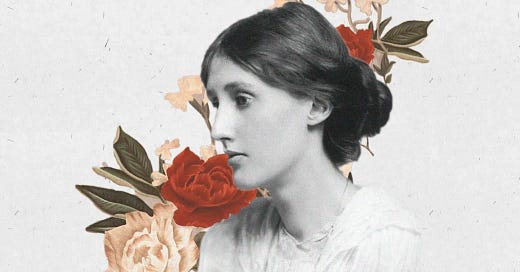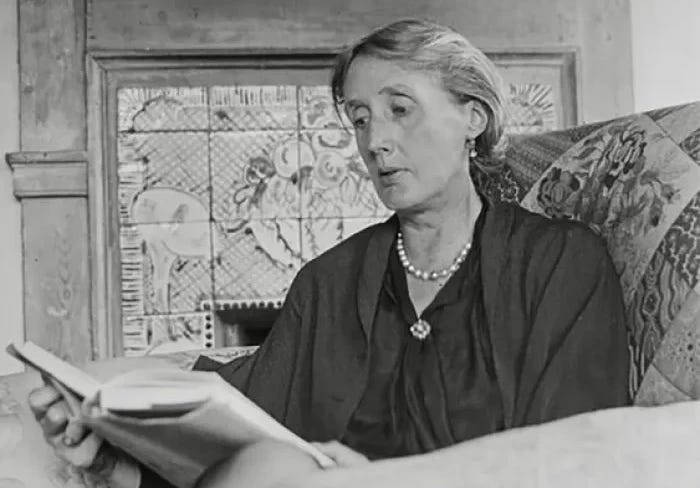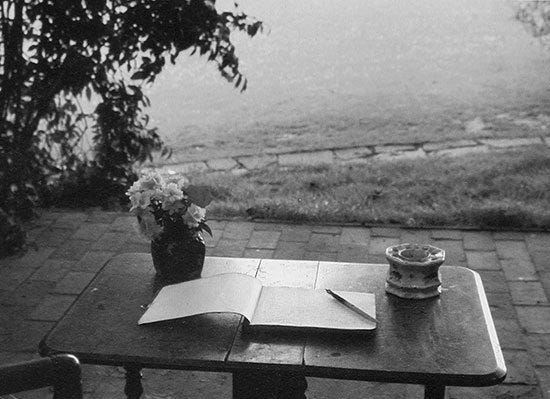Welcome to Mental Garden. The following letter is part of our "Notes on giants" collection, in which we explore the thoughts of humanity's greatest minds.
To see the full library, click here.
🏷️ Categories: Writing, Literature, Life lessons, Habits.
“A woman must have money and a room of her own if she is to write fiction."
— Virginia Woolf, A Room of One's Own.
Imagine being born into a world whose plans you are not part of.
They slam the door of opportunity in your face. There is no space, no room for you. Only the expectation that you fit into a mold you never chose. Virginia Woolf was born into that world.
And she decided to write her own way out and create her own space.
A room of her own, space enough to find her voice. Woolf wrote stories in which she unraveled the way we think, feel, remember, forget and cry. While many wrote clear plots and closed endings, she unraveled the scheme to write in complex plots, where the background of the characters and their setting were more important than the action itself.
This text is for you.
For those who doubt their voice when writing, for those who feel that their writing is nothing more than a jumble of thoughts. Let's take a closer look at Virginia Woolf: how she found her style, what her day-to-day life was like, how she transformed the everyday into literature.
And how you can do it.
1. Writing with rhythm
For Virginia, the essence of style in writing was not in choosing the perfect words, it was in rhythm. In a letter she wrote to her lover Vita Sackville-West, she wrote:
“Style is a very simple matter: it is all rhythm. Once you have it, you can't use the wrong words.” - Virginia Woolf, The Letters of Virginia Woolf.
It's about feeling how it sounds, how the sentences flow, how they are spun. Without rhythm, writing becomes heavy as lead. With rhythm, it flows.
Want to see what she meant? I'll write an example to show you.
No rhythm: He was walking down the alley while it was raining. In one hand he carried his umbrella, while with the other he pulled a pistol from his trench coat. His victim turned the corner and there was no one else. It was his moment, the killer took aim and fired. The man fell to the ground leaving a pool of blood that mixed with the rainwater.
Rhythm: He advanced under the umbrella as the rain poured down the alley. On the other side, the victim rounded the corner. Alone. He slowly descended his hand to the inside of the coat. A flash of metal, a whimper and —bang!— the gunshot broke the silence. A bullet. A man lying. A pool of blood mingled with rainwater.
Same length, same idea, different rhythm. Notice the difference? I'm sure you do.
Virginia's rhythm is neither uniform nor predictable, that made her captivating.
How the narrative expands and contracts according to the moment, the scene... In her work Mrs. Dalloway, sentences lengthen like a deep sigh and then break into short fragments, like a sudden aspiration. The same happens in To the Lighthouse.
“Yes, the breeze was intensifying. The boat was tilting, the water was cutting precisely and falling in cascades, in bubbles, in torrents. Cam looked down at the foam, at the sea with all its treasures, and its speed mesmerized her, causing the bond between her and James to loosen a little.
She began to think: How fast he's going, where are we going? And the motion mesmerized her, as James, with his eyes fixed on the sail and the horizon, steered the boat with determination.” — Virginia Woolf, The Lighthouse.
Give it a try: read aloud what you write. How does it sound? Monotone? Adjust.
2. Finding the extraordinary in the ordinary
‘A large part of each day is not consciously lived’. - Virginia Woolf, Moments of Being.
Woolf felt that life slips away from us in the routine, in the coming and going of the hours. But every now and then, something lights up. An instant becomes sharp, as if the world stops and only one thing matters. She called them ‘moments of being’.
Light trembling over a cup of tea.
A bouquet of flowers bought in the morning.
A random overheard conversation in the street.
Here are two ‘moments of being’ she reflected on:
‘The impact of poetry is so strong and direct that, for a moment, there is no other sensation except that of the poem itself.’ - Virginia Woolf, How should one read a book.
‘Life itself, every moment of it, here, this instant, now, in the sunshine, in Regent's Park, was enough. Too much, in fact. - Virginia Woolf, Mrs Dalloway.
Minuscule details, which we sometimes overlook, but which enclose a whole world of feelings. Art is not in what you do, but in how you feel. In To the Lighthouse, a simple boat ride contains years of nostalgia, loss and hope. In Mrs Dalloway, a woman buys flowers.
An insignificant event.
But Virginia uses it to talk about joy and the inner struggle of a character.
It reminds me a lot of the Japanese concept of ‘Ichi-go Ichi-e’.
To train your ability to narrate these events, go deep in your journal and talk about moments of the day that you usually overlook, dig into how they make you feel, what they mean. Write about the everyday as if it were the most important thing in the world.
Because it is.
3. Doubts will never go away
At some point, every artist has felt that his work is worthless.
Woolf felt the same. In Orlando, she describes a writer who oscillates between ecstasy and despair with every sentence. In her diary she also confesses.
‘I must write without worrying whether it is good or bad. I must go on. — Virginia Woolf, A writer's diary.
It is impossible to eradicate doubts forever. Kafka is another who always doubted his worth. Doubts are like weeds in the garden: they always come back. Learn to live with it, write and prove yourself every day. Waiting until you feel ready is the road to never writing.
Try this: Sit down and write without editing. Without looking back, without editing. Then let the text sit. When you come back, you'll see what's inside that jumble and there's bound to be something worth salvaging.
If you ask me, that advice was key for me.
I learned it early on from Isaac Asimov and I see Woolf did the same. I sit down to write for an hour without stopping and let the words flow. It doesn't matter if it's a jumble of sentences. I don't care. Then I'll rescue what's worthwhile.
4. The diary is a laboratory
Many writers have written diaries, and there is a reason behind it.
Virginia discovered throughout her life the potential of a diary for an artist. It is a space for play, a space without rules where you can try out phrases, rhythms, ideas without having to meet expectations. It is the place where one rehearses, where one writes with maximum freedom and minimum commitment.
‘I think over the last year I have noticed a certain ease in my professional writing, which I attribute to my casual half-hours after tea.’
— Virginia Woolf, A writer's diary.
These ‘casual half-hours’ were the time she spent writing in her diary, times of free rambling in which, little by little, she saw ideas with potential emerge.
‘It may be that in time I shall learn what can be done with this loose and drifting material of life, finding another use for it than the one I put it to.’
— Virginia Woolf, A writer's diary.
Therein lies the key: Writing for yourself is writing without fear.
And that changes the rules.
Out of all those ideas you write in your diary, some will emerge that have the potential to be more than just reflections on the everyday and one-liners. Fragments will emerge, which could see the light of day as part of a great work. That was the conclusion she herself came to over time.
‘Here are the bricks for a very good book’. — Virginia Woolf, A writer's diary.
I have experienced it in my own diary: insignificant reflections have ended up becoming Substack letters. Fragments that were originally loose ideas, as Virginia says, ‘bricks’ to build something very good.
If you're just starting to write, I'll tell you something I learned and am grateful to have done.
Do like Virginia, do those ‘half hours after tea’. I suggest you do it by writing in a journal, it's the easiest thing to start with. Find a time during the day and write without expectation about what happened during the day, what's on your mind. You will see that, over time, your vision changes: you become an observant person, attentive to the small details of life. And there, in the everyday, is where the raw material for great works is hidden.
5. Read and write without asking permission
‘The only advice one person can give another about reading is not to take advice, to follow one's own instincts, to use one's own reason, to come to one's own conclusions’. — Virginia Woolf, How should one read a book.
Let curiosity guide you.
We live in a world obsessed with ‘must read’ lists. So many book recommendations are written that, at this rate, they will become a literary genre in their own right. It's breathtaking.
If you want to follow Woolf's advice, read what you want and by whom you want.
The most transformative reading is the one you least expect, the one you haven't read a review of, the one that isn't on any must-read list, the one you open your eyes to, letting curiosity take you page after page.
That's what I told a good friend of mine. What matters is what you do.
You don't need a book recommendation to ‘give you permission’ to read the work. And the same applies to writing, no one has the absolute truth about what is valid and what is not. Only you decide what words matter.
Woolf didn't ask permission to write the way she wanted. Neither should you.
✍️ Your turn: Which of Virginia's reflections resonate with you? Did you have anything in common? I do, especially the part about journaling.
💭 Quote of the day: Another moment of being: ‘In that moment, as so often happens in London, there was a complete calm and suspension of traffic [...] A single leaf fell from the tree [...] Somehow it was like a falling sign, a sign pointing to the strength in things that are overlooked’.
See you soon, hugs! 👋










thank you, alvaro.
Thank you, Alvaro, this was awesome. I especially related to the last bit about reading whatever you want instead of what someone else recommends. So very true. It's the best way to cultivate your voice other than actually writing; you read genres and styles that appeal to you, learning their rhythm. Then you move on to writing your own stories/poems, not copying theirs, but learning from the authors.
Lately, I've been learning a lot from substackers who write haiku and flash fiction: 50 and 100 word stories. Excellent exercise is tight writing. It's fun and unintimidating and magical. Also, strangely, writing blurbs on Facebook about the events of our lives is similar to what Virginia suggests. Writing about those little moments in our days is good training too.